The Impact of the Equal Employment Opportunity Commission on Business

In fiscal year 2016, the U.S. Equal Employment Opportunity Commission (EEOC) collected “more than $482 million for victims of discrimination in private, federal, state, and local government workplaces.”
In fact, the EEOC was in high demand for the 2016 fiscal year – with more than 585,000 phone calls and over 160,000 inquiries at its offices. The EEOC covers a broad range of complaints filed by job applicants and existing employees, and discrimination charges can range from those related to gender and sexual orientation to age and race.
We studied 2016 discrimination complaints filed with the EEOC to understand better how far these cases tend to go through the judicial system, how much they cost employers, and which parts of the U.S. face the highest percentage of these complaints.
The EEOC’s specific terminology for the actions taken on charges brought to its attention have been altered in this project to the following:
- Closed for Administrative Reasons indicates an Administrative Closure
- Referred Elsewhere indicates an Unsuccessful Conciliation
- Closed for Lack of Cause indicates No Reasonable Cause
- Withdrawn After Employer Addressed Complaint indicates a Withdrawal with Benefits
- Settlement indicates Settlement (negotiated)
- Judgment indicates a Successful Conciliation
Continue reading to learn more about how discrimination and equal employment opportunity laws impact U.S. workplaces today.
Racial Discrimination in the American Workplace
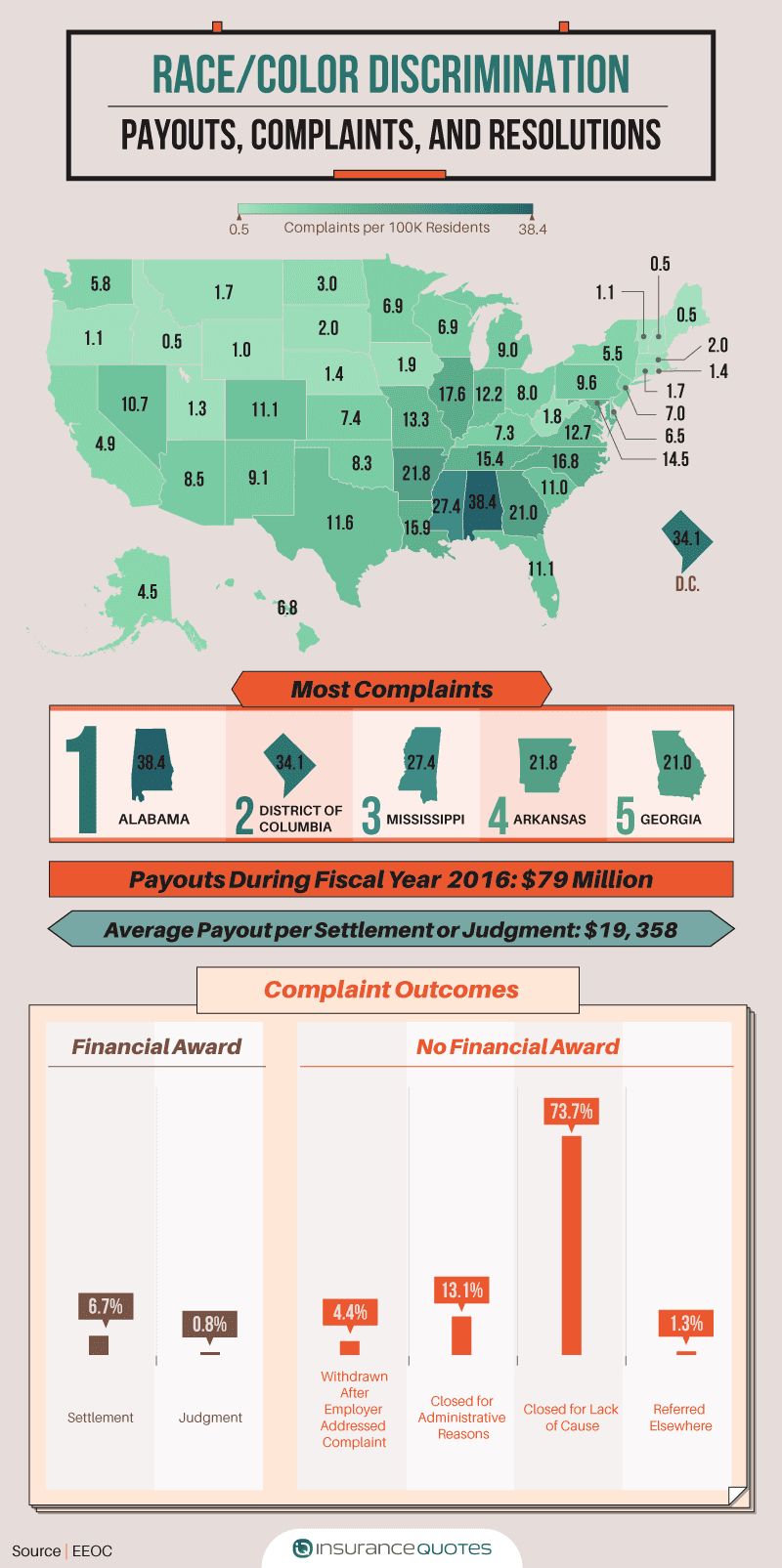
Despite nearly three-quarters of racially motivated discrimination cases deemed without a reasonable cause (meaning there wasn’t enough evidence obtained throughout the investigation to pursue public damages) in 2016, these allegations accounted for $79 million in settlements and payouts over the fiscal year.
While most cases filed don’t proceed to a court or settlement, more than two-thirds of African-Americans and over half of Hispanics in the U.S. said past and present racial discrimination are a reason for the problems their ethnic groups face.
Physical evidence or not, nearly half of Americans recognize racism is an issue in the country. Research has shown job applicants with “very African-American sounding” names are less likely to earn a call back than those with traditionally Caucasian names, and in 2013, Forbes published an article on the likelihood of natural African-American hairstyles keeping people from landing a job.
In 2012, Alliant Techsystems settled with a potential employee who was told to remove her braids to look more professional. After several interviews and the promise of a position, she restyled her hair in braids before meeting with the IT director. She received a call the following day that she would not be hired.
Alabama – where the infamous Tuskegee Experiment was held – leads the nation in the number of complaints per 100,000 residents appealing to the EEOC on cases involving race.
Sex-Based Discrimination in the American Workplace
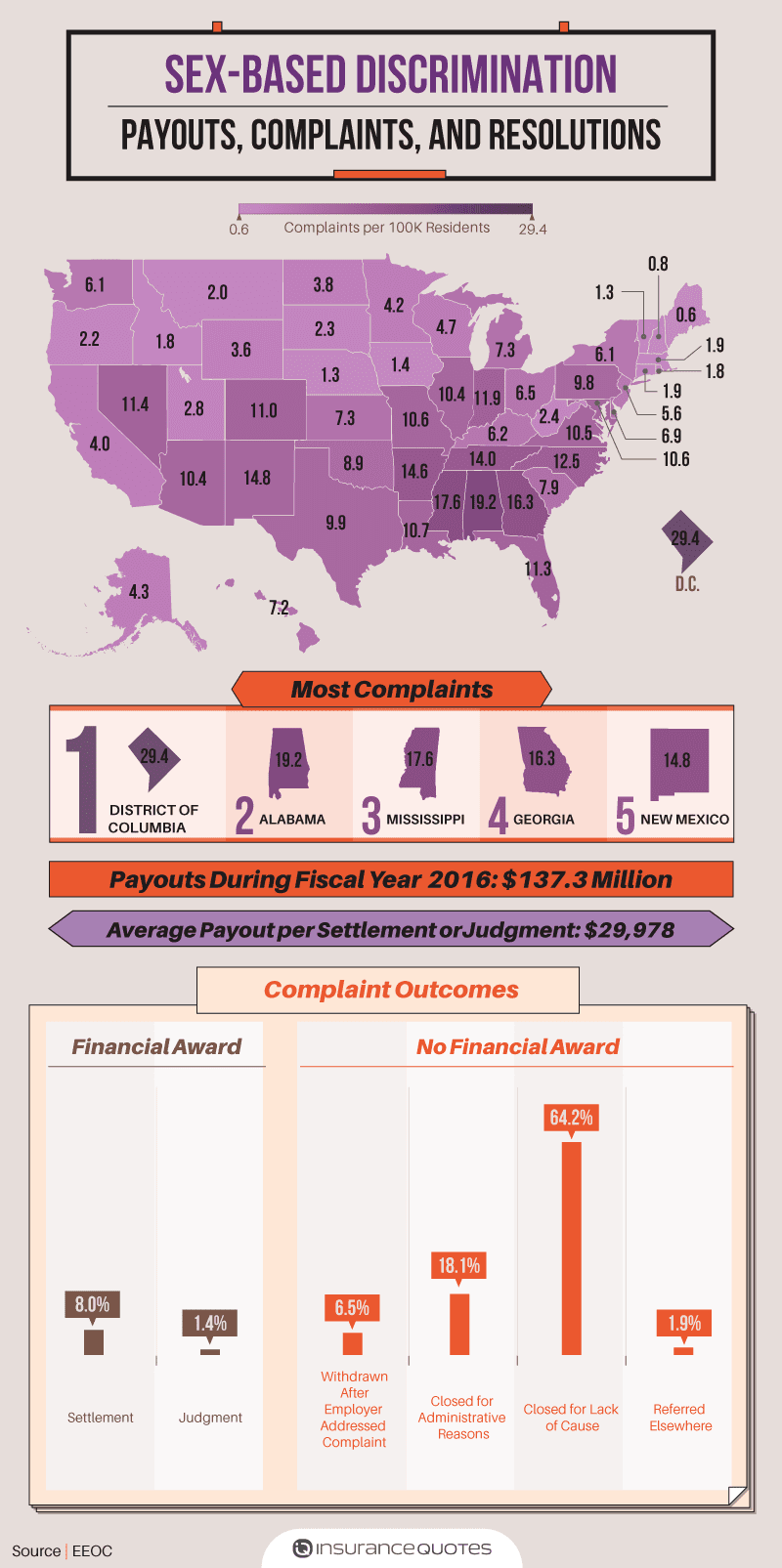
More than 6 in 10 EEOC cases involving sexism at work in the U.S. were deemed without a reasonable cause, while almost 15 percent of cases were settled out of court or withdrawn due to the company agreeing to address the matter. To say nothing of the costs involved in legal billings for consultations and court costs, in 2016, costs to businesses due to sex-based discrimination damages exceeded $137 million.
While nearly two-thirds of sexual harassment cases in 2016 weren’t substantial enough to merit more than a cursory investigation of the facts, many high-profile cases over the years have chronicled systemic sexism in the workplace. In 2016, Roger Ailes resigned from Fox News after a lawsuit was filed against him for alleged sexism and misconduct, costing the company more than $2.5 million. In 2015, Twitter and Microsoft were accused of gender discrimination. In 2014, JPMorgan Chase paid over $1.4 million to settle a sex-based discrimination lawsuit.
While significant displays of sexism can make headlines and big lawsuits, subtle manifestations of sexism can have an equally profound effect on women in the workplace. Over 18 percent of sexual discrimination cases ended due to administrative closure. Studies have shown women often fail to pursue charges of sexual harassment because they fear they won’t be believed or might experience professional retaliation. This research indicates that only a quarter of women reported some variation of sexual harassment, while almost half acknowledge specific behaviors in the workplace, like inappropriate touching and requests for sexual favors.
Alabama and Washington, D.C., rank the highest by population size in sex-based discrimination complaints.
LGBT-Related Sex-Based Discrimination in the American Workplace
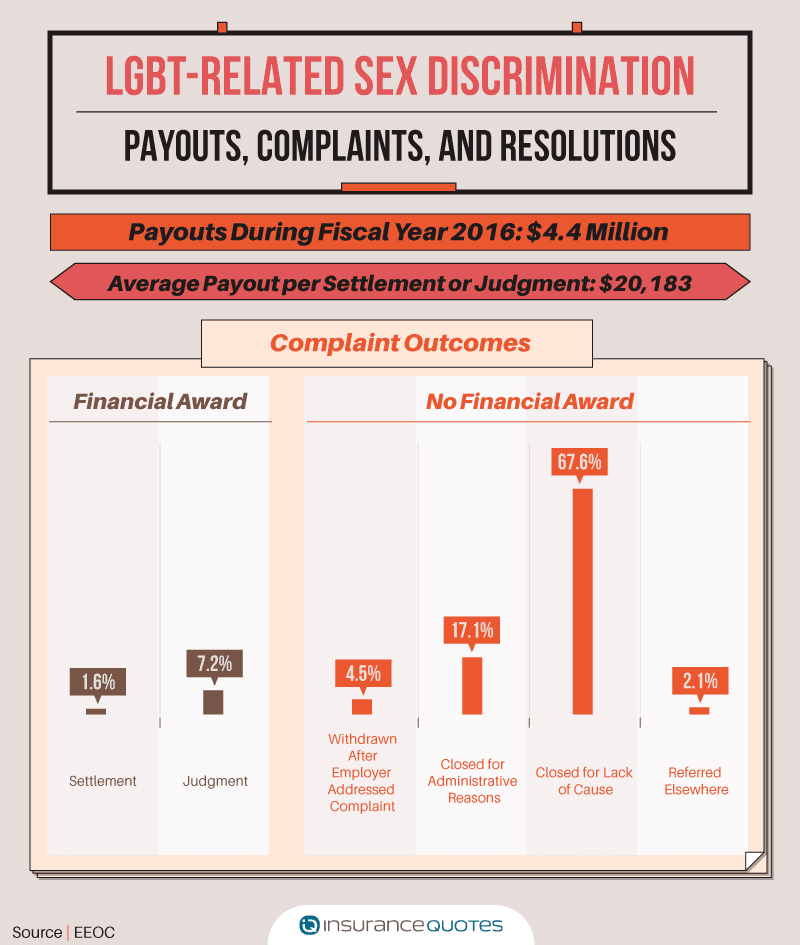
According to a survey conducted by UCLA’s Williams Institute, roughly 4 percent of the U.S. workforce “identifies as lesbian, gay, bisexual, or transgendered (LGBT).” Of the 4 percent, more than 1 in 5 have felt discriminated against during the hiring process, for promotional consideration, or regarding compensation. While the EEOC interprets Title VII of the Civil Rights Act of 1964 to include discrimination against a job applicant or employee based on their “gender identity or sexual orientation,” many states have yet to pass anti-discrimination laws, and the Supreme Court has yet to rule on the matter that was just decided on in an Appeals Court Ruling.
Religious Discrimination in the American Workplace
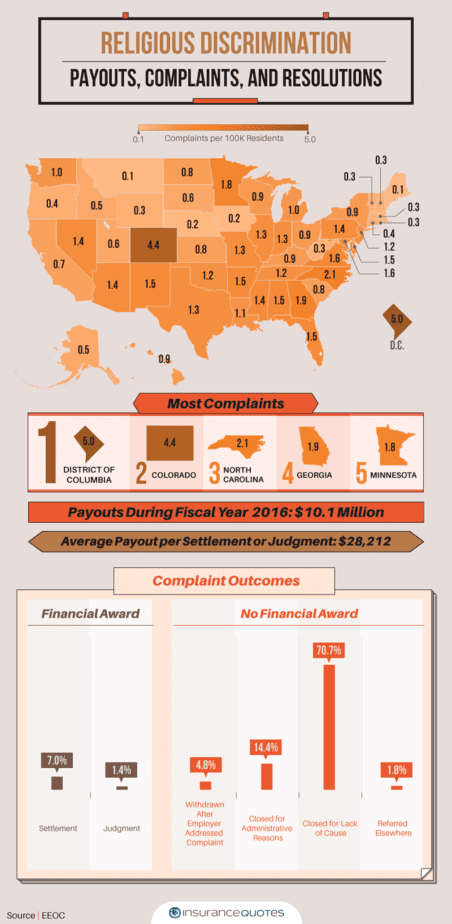
In 2016, more than two-thirds of religion-based EEOC cases were found to be without merit or reasonable cause. Over the last two decades, the number of complaints filed with the EEOC for religious discrimination has more than doubled, and in 2016, more than $10 million was paid in settlements and damages for religion-based allegations.
As the debate over travel bans in the U.S. continues to wage on, religious discrimination remains a concern for men and women in the workplace today. In 2015, a woman won her case with the Supreme Court for a lawsuit filed against Abercrombie & Fitch when the clothing retailer failed to hire her because her hijab “clashed with its dress code.” However, this is not the first allegation leveled against Abercrombie & Fitch; the company previously paid over $70,000 in settlement costs for two similar suits in 2013. Like sexual orientation, Title VII of the Civil Rights Act of 1964 protects U.S. workers from religious discrimination in the hiring process or toward existing employees.
At least one study found employees who feel comfortable being open about their religion at work are happier, and employers should aim for religion-friendly policies to encourage religious expression to create a culture of inclusion among team members.
Age Discrimination in the American Workplace
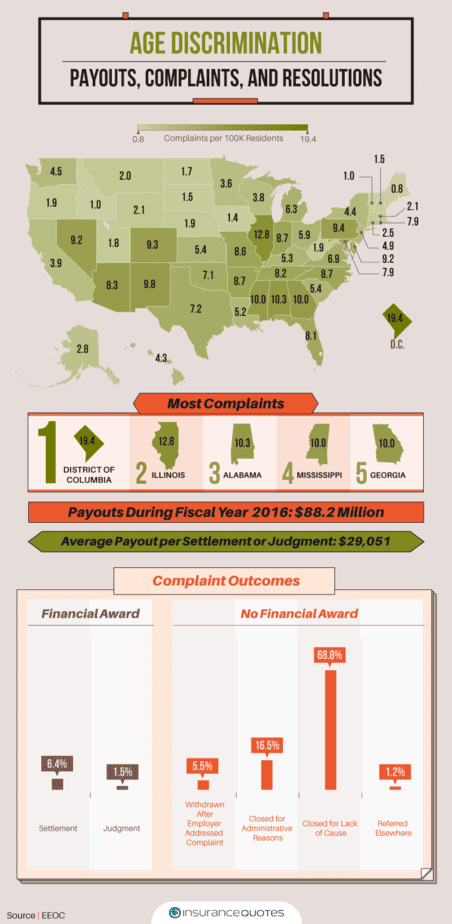
Like many other types of discrimination in the workplace, the majority of age complaints were found to be without reasonable cause. For the more than 1 in 5 cases that were found to be of reasonable cause, settled, or ended with merit resolutions, damages were more than $88 million in 2016.
Florida, Texas, California, and Illinois had the most cases of perceived age discrimination, however, based on population size, Washington, D.C., and Illinois lead the way in EEOC age-related complaints.
Age discrimination in the workplace can begin as early as 35 years old, and critics of ageism suggest technology – and especially tech-related jobs – are a primary reason for these concerns.
The average employee at tech giant companies like Apple (31 years old) and Google (29) is younger by an entire decade or more than the average employee in America, considering that the median age of all U.S. workers is 41. Like other forms of EEOC discrimination, laws instituted to protect employees in the workplace can be vague and aren’t always substantial enough to ensure that your LinkedIn profile picture doesn’t hold you back from landing a job – or even an interview.
Discrimination Case Resolutions
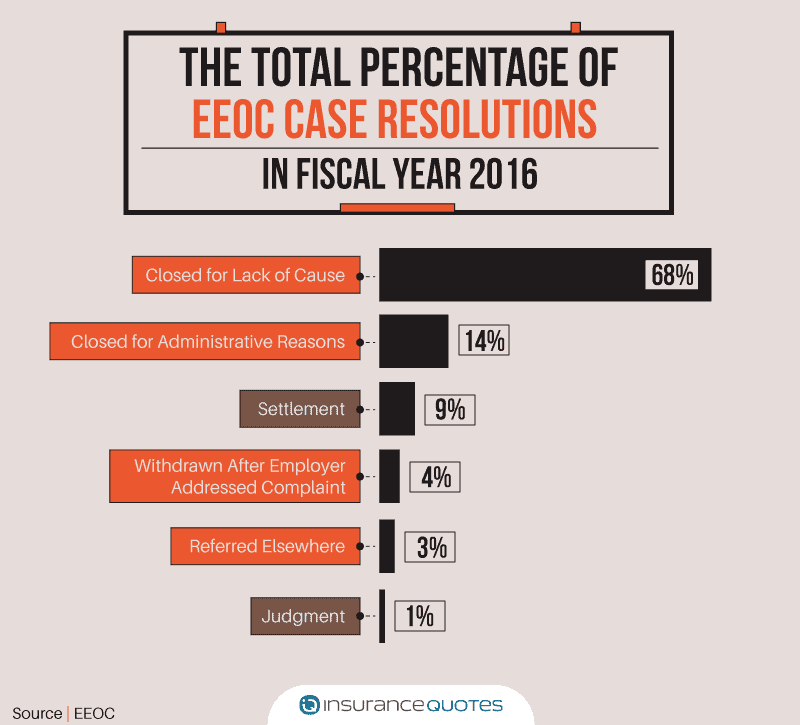
In 2016, more than two-thirds of all complaints and cases brought forward to the EEOC were closed and listed as without reasonable cause. Without proper evidence, employees will not have their cases seen by civil courts. They can, however, choose to pursue their case in private court should their allegations be found as without reasonable cause. Simply defending these cases can be expensive for employers, costing between $75,000 and $125,000. Should the case come before a jury for a verdict, however, it can cost an employer significantly more – ranging from $175,000 to $250,000 on average.
Landscape of U.S. Workplace Discrimination
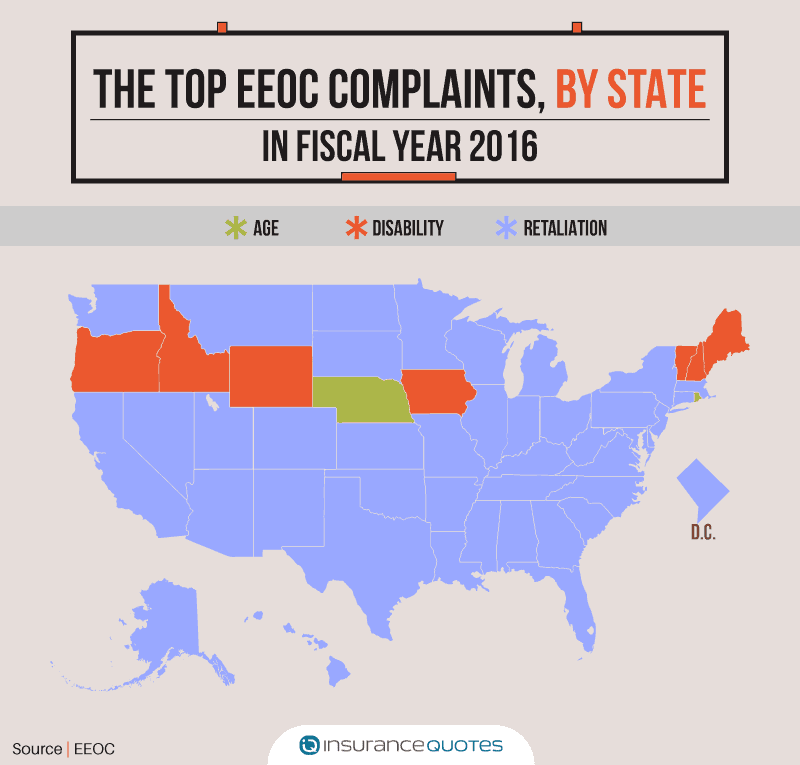
Across the U.S., retaliation was the most common allegation. The EEOC describes retaliation as punishment incurred after an employee asserts his or her rights to be free from discrimination (even in instances of acting as a witness for an existing lawsuit, communicating with a superior about employment discrimination, or refusing to follow orders that could result in discrimination). In 2016, almost 40,000 retaliation cases were filed, equating to nearly 45 percent of all charges filed.
Disability charges made up the largest number of cases filed in Oregon, Idaho, Wyoming, Maine, New Hampshire, and Vermont.
Race-related discrimination charges were heaviest in southern states likes Arkansas, Mississippi, and Alabama, as well as in Wisconsin.
What It Costs to Settle
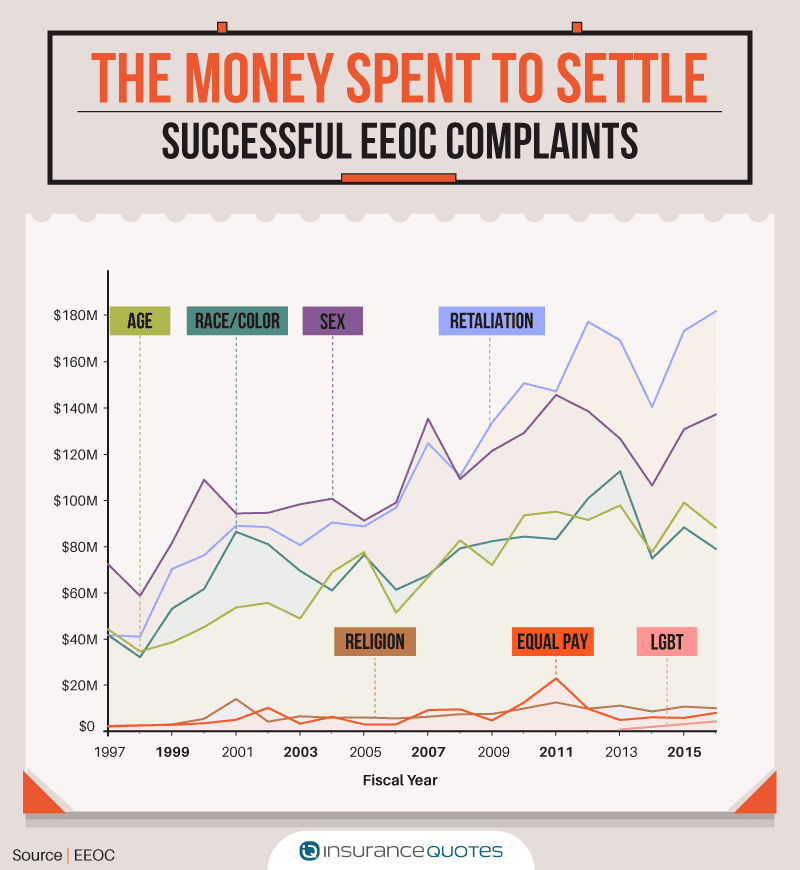
Retaliation complaints filed with the EEOC (which accounted for nearly half of all cases in fiscal year 2016) rose to a total settlement cost of over $180 million. Retaliation settlements have also seen the sharpest incline over the last two decades, rising more than four times the total cost of $40 million in 1997.
Sex-based discrimination cases saw a significant decline in settlement costs between 2011 and 2014, falling from over $140 million to less than $115 million, but rose again in 2016 to almost $140 million – the second highest settlement amount in the U.S.
Race- and age-based settlements totaled between $80 and $90 million for the fiscal year, a decline from cases just one year prior.
LGBT cases, equal pay concerns, and religion-based complaints had the lowest settlement costs to employers, averaging $10 million or less in 2016.
How Much Discrimination Cases Cost
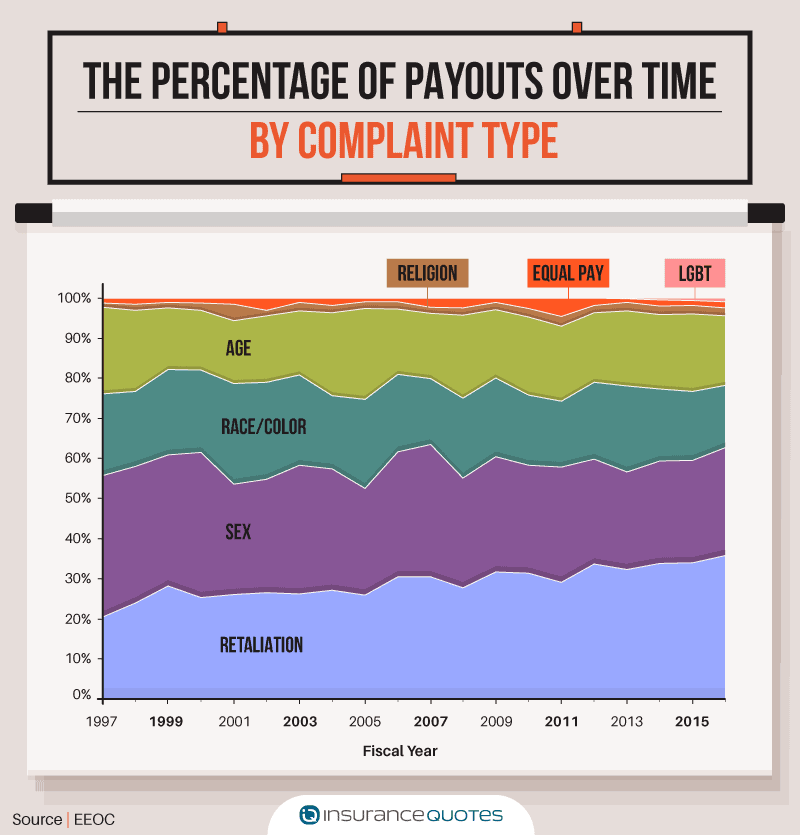
When it comes to monetary compensation, retaliation cases accounted for more than one-third of all benefits paid in fiscal year 2016. While gender-related offenses accounted for the largest percentage of financial benefits at one point, their positions have reversed. In 2016, gender-related complaints accounted for just over a quarter of all payments issued to charging parties.
While age- and race-related damages equated to more than a third of total costs for the year, cases involving religion, equal pay, and LGBT issues represented less than 5 percent of monetary awards stemming from EEOC suits in 2016.
Protecting Your Employees, Protecting Your Brand
In 2016, the EEOC announced changes to the Employer Information Report – or the EEO-1. The report, which historically has collected data on employees by their job category, gender, race, and ethnicity, will be expanded in 2018 to include summaries of their pay. This means employer compensation practices will be under tighter scrutiny in coming reports. You should make sure you have the best business insurance coverage for legal situations that can arise.
Methodology
We made a specialized request to the Equal Employment Opportunity Commission for the information related to the above. If added up, the above percentages based on State Percentage of EEOC charges filed will not equal 100 percent, as we did not depict the Genetic Information Nondiscrimination Act, National Origin, Equal Pay, and Disability charges.
Fair Use Statement
To all who may wish to share the material found here in part or in whole, we welcome you to do so for noncommercial purposes. We do, however, ask that if you decide to use any information we’ve researched or the images we’ve made to please link back here so that those involved in its creation can be acknowledged for their work properly.
